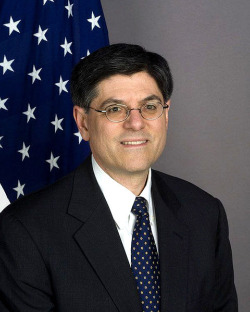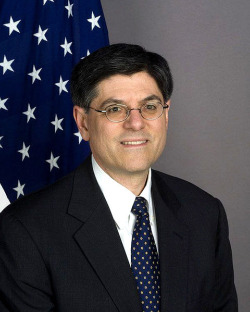 OMB director nominee Jacob Lew.Photo: Wikipedia CommonsToday, Jacob Lew heads to the hill for two Senate hearings on his nomination to be the new director of the White House’s Office of Management and Budget (OMB). He is expected to be confirmed.
OMB director nominee Jacob Lew.Photo: Wikipedia CommonsToday, Jacob Lew heads to the hill for two Senate hearings on his nomination to be the new director of the White House’s Office of Management and Budget (OMB). He is expected to be confirmed.
The hearings will likely focus on budgetary issues, but no less important is another division of OMB: the Office of Information and Regulatory Affairs (OIRA), the office charged with coordinating regulatory policy. The policy context is this: from salmonella-laced eggs to the BP oil spill, we are in a year of regulatory disasters. No one agency or individual is responsible for the breakdown; the problems are pervasive and the fixes often not easy.
The OMB could be playing a positive role in supporting regulatory agencies and helping to stop the next crisis before it happens. Instead, it has too often busied itself meddling in agencies’ processes, and rushing to stand up for industries with questionable claims of high regulatory compliance costs. Meanwhile, in the real world, toys are tainted with lead, the coal ash ponds are leaking chemicals into the water, and we move from one food contamination episode to the next.
If Jacob Lew is confirmed, he should take a fresh look at the regulatory situation and change OMB’s mindset.
A year of regulatory disasters, a systemic problem
Early this year, we learned that dozens of people have been killed in incidents involving unintended acceleration in Toyota cars. In April, 29 coal miners were killed in the West Virginia explosion. In May, the BP oil spill saga began, killing 11 workers and creating one of the biggest environmental disasters in our national history. August brought a giant egg recall, but it was too little and too late for an estimated 1,500 sickened by salmonella.
The pattern is clear for anyone who is looking. These are systemic regulatory failures, signs of government and specifically federal agencies (FDA, EPA, MMS, NHTSA, OSHA, CPSC) not able to accomplish their missions of protecting the public. There are sometimes individual bad apples involved in the failures, but usually the problems run far deeper. We simply have been too cheap, for example, to pay for enough inspectors to examine many imported toys and imported food.
We have given these agencies budgets that are miniscule in the scope of the federal budget and in the scope of the job we’ve assigned them. We spend more to buy two military planes (two individual aircraft) than we do for the entire Consumer Product Safety Commission (CPSC) each year. The CPSC is responsible for ensuring the safety of every consumer product sold in America except cars, drugs, and food.
Next, we’ve given them limited authority. When an employer commits a serious worker safety violation, something that poses a substantial probability of death or serious physical harm, the maximum penalty the government can issue is $7,000. That’s seen as just the cost of doing business. And if that weren’t enough, we’ve politically abused the agencies, allowing special interests to “capture” the agenda of agencies, and the White House to interfere in agency decision-making.
These are not problems Jacob Lew, or any one individual or office can fix. But this is the situation that the Obama administration faces. Fixing the regulatory state will require making some serious changes.
OMB in its own world
OMB’s Office of Information and Regulatory Affairs, led by Cass Sunstein, has not visibly gripped the reality of the string of regulatory failures and the systemic problems in the agencies it works with.
In July, Sunstein sent the agencies a memorandum on “guidelines and procedures for publishing the fall 2010 Regulatory Plan and Unified Agenda of Federal Regulatory and Deregulatory Actions.” The memo is absolutely remarkable for its oblivious attitude toward all of the problems that make up the pattern just described. Agencies are cautioned to worry about whether the proposed regulations on their annual agendas will have an adverse effect on small business and to begin quantifying the costs and benefits of potential new requirements before they even develop such proposals. It could have been signed by any OIRA director who served Presidents Reagan, George H.W., and George W. Bush.
In the last year, OIRA has often performed a role it played in the last administration: meddling in agency decisions and acting as an agent on behalf of regulated industries. The office has effectively hijacked EPA’s work to finally regulate coal ash, the toxic byproduct from coal power plants that is currently allowed to be dumped in unlined pits in the ground, where it seeps into rivers and groundwater and poisons wells.
OIRA interfered in EPA’s Endocrine Disruptor Screening Program, prompting pointed criticism from defenders of scientific integrity (in that case, OMB later righted the wrong). OIRA has asserted jurisdiction over “guidance documents” from regulatory agencies despite a revocation of that authority by the president; it has exceeded deadlines for completing reviews under the terms of EO 12,866; and it has failed to disclose “before and after” documents allowing the public to determine what changes were made to regulatory actions after its review.
A positive agenda for Jacob Lew
The Obama administration has shown in many instances that it “gets it” that our regulatory system needs to be fixed. The regulatory failures we’ve witnessed this year should be lessons not that we should give up on government when government has let us down, but that we should work to fix our regulatory state. As David Axelrod said, “I think we’ve tested the proposition of what no regulation means, and what you get is … the leak, the mine disaster in West Virginia, and you get an economic crisis.”
If and when he is confirmed, Jacob Lew will be overseeing the office, OIRA, that is the White House’s own agent in the regulatory world. He should make sure first that it does no harm. It should not challenge agencies on science determinations that are the realm of scientists and not economists. It should not believe astronomical predictions from industry of regulatory compliance costs. It should not use cost-benefit analyses that wildly undervalue environmental protections.
Instead, OIRA can function as a supporter of the agencies. It has a unique position to help inter-agency coordination. It can help catalogue agencies’ priorities, and assist them in identifying what legal authorities could help them achieve their missions. It can be an advocate for getting agencies the resources they need, helping them to develop budget requests that reflect the needs of getting their jobs done.
None of this is easy. But the new OMB director will have a tremendous opportunity to help mend our broken regulatory state. He ought to use
it.




